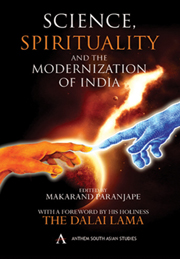Book contents
- Frontmatter
- Contents
- Notes on Contributors
- Foreword
- Editor's Preface
- I Science and Spirituality: East and West
- II Coming to Terms with Science: Some Change Agents
- CHAPTER 3 Sir Sayyid Ahmed Khan and the Modernization of South Asian Muslims
- CHAPTER 4 Acharya Jagadish Chandra Bose: Looking beyond the Idiom
- CHAPTER 5 Sri Aurobindo and Krishnachandra Bhattacharya on Science and Spirituality
- CHAPTER 6 Chaos, Complexity and Emergence Mechanisms: Spiritual Evolution in Sri Aurobindo and Teilhard de Chardin
- CHAPTER 7 Science, Spirituality and Swaraj: Towards a New Aesthetics of Ethical Existence
- III Building Bridges: Evolution, Consciousness and Healing
- IV Science and Spirituality: Culture, Society and Gender
CHAPTER 6 - Chaos, Complexity and Emergence Mechanisms: Spiritual Evolution in Sri Aurobindo and Teilhard de Chardin
from II - Coming to Terms with Science: Some Change Agents
Published online by Cambridge University Press: 05 March 2012
- Frontmatter
- Contents
- Notes on Contributors
- Foreword
- Editor's Preface
- I Science and Spirituality: East and West
- II Coming to Terms with Science: Some Change Agents
- CHAPTER 3 Sir Sayyid Ahmed Khan and the Modernization of South Asian Muslims
- CHAPTER 4 Acharya Jagadish Chandra Bose: Looking beyond the Idiom
- CHAPTER 5 Sri Aurobindo and Krishnachandra Bhattacharya on Science and Spirituality
- CHAPTER 6 Chaos, Complexity and Emergence Mechanisms: Spiritual Evolution in Sri Aurobindo and Teilhard de Chardin
- CHAPTER 7 Science, Spirituality and Swaraj: Towards a New Aesthetics of Ethical Existence
- III Building Bridges: Evolution, Consciousness and Healing
- IV Science and Spirituality: Culture, Society and Gender
Summary
It's a great opportunity to reflect on some of the best scholars' and scientists' discussion on these themes. It is also an opportunity to reflect on some areas where Eastern and Western spiritualities and modern science might engage in trialogue. One possible subject could be evolution and the future. However, since there is no consensus within spiritual traditions on this theme, we might begin our discussion with two authors from the Hindu and Christian traditions who include evolution as an integral part of their visions. Specifically, we would like to examine the writings of Sri Aurobindo and Teilhard de Chardin in the light of newer scientific theories, which may provide insights into the mechanisms of evolution.
In this paper, we will offer some of our initial reflections on this subject. We will begin with a brief introduction to the scientific fields of chaos, complexity and emergence theories and the possibilities they may offer for examining our spiritual traditions and looking to the future. These theories could actually be seen as sub-theories under the overarching theory of evolution. These new fields try to show the mechanisms by which short-term increases in complexity and long-term evolution to new entities can take place. Ultimately, we would like to show how a Divine element may be active or involved in evolution in a non-interventionist way. We want to develop a picture, which does not conflict with scientific knowledge, but may go beyond it, especially in looking to the future.
- Type
- Chapter
- Information
- Science, Spirituality and the Modernisation of India , pp. 115 - 134Publisher: Anthem PressPrint publication year: 2009

